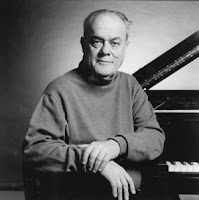Charles Rosen (1927-2012)
by Walter Frisch
Charles Rosen, a distinguished pianist and influential and prolific writer on classical music for over four decades, died in New York City on 9 December 2012, at the age of 85. He taught at SUNY Stony Brook and the University of Chicago, and in 1980–81 he held the Charles Eliot Norton Professorship of Poetry at Harvard. In 2012 President Obama bestowed the National Humanities Medal on Rosen for “his rare ability to join artistry to the history of culture and ideas.”
Rosen wrote or co-authored fourteen books, including several collections of essays that first appeared in The New York Review of Books, to which he was a regular contributor. Rosen’s prose was at once learned and engaging, reflecting a deep musicality that grew from his insights as a performer. His first book, The Classical Style: Haydn, Mozart, Beethoven, won the National Book Award in 1972. Contrary to much
traditional scholarship, it defined the musical style of a period by examining not a broad cross-section of composers but the few figures who mastered the possibilities of the contemporary musical language. The lucid, penetrating analyses in The Classical Style inspired me and others of my generation to pursue careers in musicology.
Rosen’s other magnum opus, a worthy successor to The Classical Style, was The Romantic Generation, which discussed the music of Schubert, Chopin, Liszt, Berlioz, Mendelssohn, and Schumann. It was awarded the Otto Kinkeldey Prize by the AMS in 1996.
Rosen was not a formalist, but he mistrusted explanations of music that placed a priority on biographical, social, or cultural context. “Only when the movement back and forth between historical and formal explanation starts and ends with the music itself,” he argued, “do we have any possibility of saying something sensible.”
As a pianist, Rosen’s repertoire extended from Bach’s Goldberg Variations to works by modernist composers whom he admired and who held him in high esteem. Rosen participated under Stravinsky’s baton in the first recording of Movements for Piano and Orchestra. He had long associations with Elliott Carter, whose Double Concerto he premiered, and Pierre Boulez, who invited him to record the piano sonatas. The finest of Rosen’s performances are characterized by a compelling blend of technique, intellect, and feeling. He brings out inner voices, counterpoint, and structural elements that other pianists ignore. For example, Rosen’s recordings of Beethoven’s Hammerklavier Sonata, op. 106, are the only ones I have heard that observe the diminuendo on the trill in the answer of the fugue in the finale (m. 26). The marking, which eludes even meticulous artists like Arrau, Pollini, Richter, and Serkin, clarifies the fugal form by allow ing the accompanying countersubject to be heard. This moment captures Rosen’s unique gifts as both performer and critic: delight in a musical detail that animates and illuminates the larger design
Walter Frisch is H. Harold Gumm / Harry and Albert von Tilzer Professor of Music at Columbia University in New York, where he has taught since 1982. This article first appeared in the AMS Newsletter 43/1 (February 2013), 38-39.
- New York Times obituary: Margalit Fox, “Charles Rosen, Scholar-Musician Who Untangled Classical Works” (etc.), New York Times, 10 December 2012.
- NPR feature: Anastasia Tsioulcas: “Remembering Charles Rosen, A Prodigious Pianist and Polymath,” NPR Deceptive Cadence, 10 December 2012, with audio and links.
- YouTube Charles Rosen channel
- Charles Rosen essays at the New York Review of Books ($)


